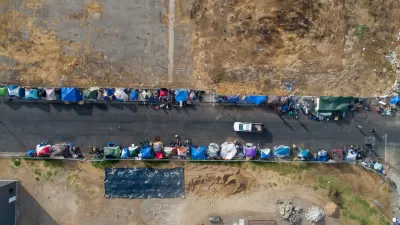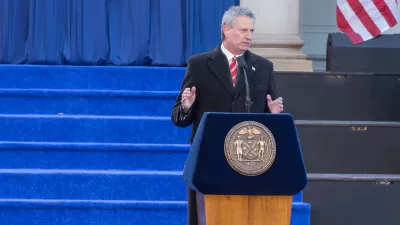A new study conducted by former Boston Mayor Tom Menino and the Initiative on Cities at Boston University surveyed 70 mayors on their challenges, policy agendas, and relationships.
During his 20 year tenure as mayor of Boston, Tom Menino chatted with many different mayors on their experiences in city government. Driven by these conversations, Menino spearheaded a nationally representative study of American mayors on policy priorities and challenges, controlling for city size and political party.
Often seen as more nimble than federal bureaucrats, mayors are cited as not letting partisan politics influence their policies. Despite this, as Alexis Stephens of Next City discusses, there are key differences between Republican and Democratic mayors in this study.
In general, mayors cited aging infrastructure and fiscal, budgeting concerns as their top two challenges. However, as Stephens writes: "Breaking down the same answers by political affiliation exposes a divide on priorities... with Republican mayors emphasizing 'economic development' challenges, and financial management at the head of the list for Democratic mayors."
Overwhelmingly, the most obvious policy discrepancies between Democratic and Republican mayors were more ideological. "The surveyors also asked the mayors whether the government should try to close the gap between rich and poor, even if it came at the expense of businesses and/or the affluent. Republican mayors overwhelmingly were opposed (almost 90 percent), while more than half of the Democrats agreed with the tradeoff approach... This might have to do with the different challenges, particularly fiscal, that Democratic mayors are facing."
With regard to economic health, the study also found that mayors from poorer cities were more likely to "support gentrification"— an increase in property values even at the expense of displacing the city's poor— than mayors of wealthier cities.
FULL STORY: What Keeps U.S. Mayors Awake at Night?

Maui's Vacation Rental Debate Turns Ugly
Verbal attacks, misinformation campaigns and fistfights plague a high-stakes debate to convert thousands of vacation rentals into long-term housing.

Planetizen Federal Action Tracker
A weekly monitor of how Trump’s orders and actions are impacting planners and planning in America.

San Francisco Suspends Traffic Calming Amidst Record Deaths
Citing “a challenging fiscal landscape,” the city will cease the program on the heels of 42 traffic deaths, including 24 pedestrians.

Defunct Pittsburgh Power Plant to Become Residential Tower
A decommissioned steam heat plant will be redeveloped into almost 100 affordable housing units.

Trump Prompts Restructuring of Transportation Research Board in “Unprecedented Overreach”
The TRB has eliminated more than half of its committees including those focused on climate, equity, and cities.

Amtrak Rolls Out New Orleans to Alabama “Mardi Gras” Train
The new service will operate morning and evening departures between Mobile and New Orleans.
Urban Design for Planners 1: Software Tools
This six-course series explores essential urban design concepts using open source software and equips planners with the tools they need to participate fully in the urban design process.
Planning for Universal Design
Learn the tools for implementing Universal Design in planning regulations.
Heyer Gruel & Associates PA
JM Goldson LLC
Custer County Colorado
City of Camden Redevelopment Agency
City of Astoria
Transportation Research & Education Center (TREC) at Portland State University
Jefferson Parish Government
Camden Redevelopment Agency
City of Claremont




























